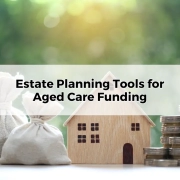Financial Planning for Aged Care: A Step-by-Step Guide
Table of Contents
ToggleAs Australians age, understanding the financial complexities of aged care becomes increasingly critical. Planning ahead can alleviate unnecessary stress, safeguard financial independence, and ensure loved ones receive the care they deserve. This comprehensive guide delves into the key considerations, steps, and strategies required to effectively navigate the aged care system from a financial perspective.
Understanding the Australian Aged Care System
The Australian aged care system comprises both home care and residential care options. It is funded through a mix of government subsidies, personal contributions, and means-tested fees. Navigating this system requires an understanding of eligibility assessments, care packages, and funding models. The My Aged Care portal is the gateway to services, but without proper financial planning, families can struggle to determine affordability and sustainability.
Types of Aged Care Services
Aged care services include Home Care Packages (HCPs) for those preferring to remain at home and Residential Aged Care for individuals needing full-time care. Each option comes with its unique financial implications, from daily fees to accommodation bonds.
Eligibility Assessments
Accessing aged care services begins with an ACAT (Aged Care Assessment Team) assessment, determining care needs and funding eligibility. This is a pivotal step in understanding financial obligations and government support.
Costs Associated with Aged Care
Understanding aged care costs is critical to effective financial planning. Fees vary based on individual circumstances, the level of care required, and financial means testing.
Basic Daily Care Fee
This is a standard charge for all residents, currently capped at 85% of the single Age Pension. It covers basic living expenses such as meals, cleaning, and laundry.
Means-Tested Care Fee
A means-tested fee applies to individuals with higher income and assets. Calculated by the Department of Human Services, this fee ensures those with greater financial resources contribute more to their care.
Accommodation Costs
Accommodation payments vary and can be paid as a Refundable Accommodation Deposit (RAD), Daily Accommodation Payment (DAP), or a combination of both. Understanding these options is essential to determine the most cost-effective solution.
Extra and Additional Service Fees
Optional services such as premium meals, entertainment, or private rooms may incur additional fees. These costs can significantly impact overall financial commitments.
Assessing Your Financial Position
Before committing to aged care services, it is crucial to assess your current financial situation, including income, assets, and liabilities. This analysis ensures decisions are sustainable over the long term.
Income and Assets Assessment
A financial assessment determines your contribution toward means-tested fees. Key considerations include pensions, superannuation, property, and other investments.
Cash Flow Management
Managing cash flow is vital to ensure ongoing care costs are met without depleting savings. Strategies such as creating income streams and reducing unnecessary expenses play a pivotal role.
The Role of Superannuation and Pensions
Superannuation and pensions often form the backbone of funding aged care costs. Leveraging these income streams effectively can maximise financial outcomes.
Age Pension and Aged Care
The Age Pension can help offset aged care costs but may be impacted by means testing. Understanding how to optimise pension entitlements while covering care fees is critical.
Using Superannuation to Fund Aged Care
Superannuation can provide tax-effective income to fund aged care fees. Deciding whether to draw a lump sum or establish an income stream requires careful planning.
Selling or Retaining the Family Home
For many families, the family home represents their largest asset. Deciding whether to sell or retain it to fund aged care involves careful analysis.
Financial Implications of Selling the Family Home
Selling the family home can provide liquidity for a Refundable Accommodation Deposit (RAD) or ongoing care costs. However, this decision may affect pension entitlements and incur capital gains tax in some cases.
Retaining the Family Home
Retaining the home can preserve family wealth but may require alternative funding strategies, such as renting out the property or accessing a reverse mortgage.
Estate Planning Considerations
Estate planning is a critical component of financial planning for aged care. Ensuring assets are distributed according to your wishes while minimising taxation and costs is essential.
Power of Attorney and Guardianship
Appointing a trusted individual to manage financial and medical decisions is vital if you become unable to make decisions yourself.
Updating Wills and Beneficiaries
Regularly reviewing and updating your will ensures assets are distributed in line with your intentions and reduces the risk of disputes.
Strategies to Minimise Aged Care Costs
There are several strategies to reduce aged care costs without compromising the quality of care.
Structuring Assets to Reduce Means-Tested Fees
Reorganising assets, such as superannuation or investments, can help reduce means-tested care fees while maintaining income streams.
Gifting and Centrelink Rules
While gifting assets to family members may seem appealing, strict Centrelink rules apply to prevent artificial reduction of assessable assets. Planning must adhere to legal thresholds.
Financial Products for Aged Care Funding
Specialised financial products can help fund aged care while preserving wealth for future generations.
Aged Care Annuities
Aged care annuities provide guaranteed income to cover care costs while potentially improving Age Pension eligibility.
Reverse Mortgages
Reverse mortgages allow homeowners to access equity in their property to fund aged care expenses without selling their home outright.
The Importance of Professional Advice
Given the complexities of aged care financial planning, seeking expert advice is essential. Accredited aged care financial advisers provide tailored strategies to optimise financial outcomes.
Benefits of Consulting an Aged Care Specialist
Specialists navigate the nuances of aged care fees, funding options, and asset structuring to minimise costs and protect family wealth.
How to Choose the Right Financial Adviser
Look for advisers with aged care accreditation, proven experience, and a client-first approach to ensure the best outcomes for your situation.
Common Mistakes to Avoid in Aged Care Planning
Avoiding common pitfalls can save families unnecessary stress and financial strain.
Delaying the Planning Process
Procrastination can limit your options and lead to rushed, costly decisions. Early planning ensures informed choices and financial preparedness.
Failing to Understand Fees and Charges
Misinterpreting aged care fees can result in unexpected financial burdens. Always seek clarity on costs and their implications.
Conclusion
Navigating the aged care system can be challenging, but with thoughtful financial planning, families can ensure their loved ones receive quality care without jeopardising financial security. Partnering with an accredited financial adviser provides peace of mind, clarity, and the confidence to make informed decisions for the future.









